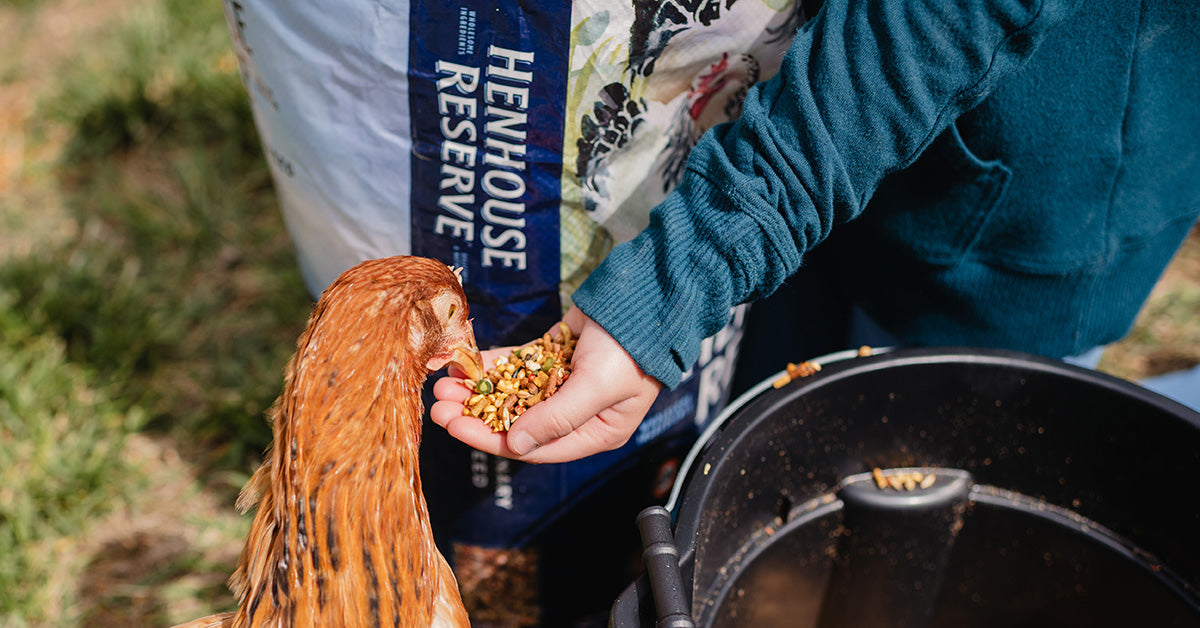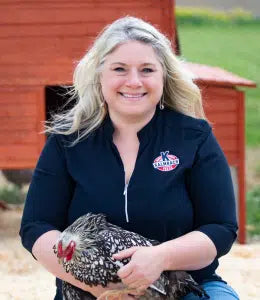Why Chickens Sometimes Sort Their Feed

How many of you love Henhouse Reserve®? The popularity of our Henhouse Reserve® line has exploded in the last couple of years. Our birds and our customers absolutely love Henhouse Reserve®! So, why do the birds sometimes sort through the ingredients of this chick feed? Today, we are going to talk about why chickens are natural sorters and how we can make sure our birds are still getting the best nutrition possible.
Chickens are Natural Pickers
Have you ever watched a free-ranging chicken at work? Chickens are natural pickers. Hens will spend hours every day scratching, pecking, and sorting their way across acres of potential food sources. Chickens spend a lot of time and energy exposing potential food sources and then choosing the food source that is best for them.
When farmers first started raising domesticated chickens, the birds were often responsible for finding their own food and self-regulating their nutrient intake. In fact, it wasn’t uncommon for chickens to get no other food except for what they could find themselves. Dogs and cats were raised in a similar manner!
As we learned more about animal nutrition and how important a balanced diet is to the health and vitality of our animals, we started to make supplements (e.g., scratch grains!) and then complete feeds for our feathered friends. Today, we have a plethora of complete chicken feed options and our birds are healthier and happier because of these advances in nutrition.
Crumbles and Pellets for Chickens
Because chickens are natural pickers, most poultry feeds that you see in a store are either crumbles or pellets. Crumbles and pellets standardize each bite of feed so that the birds cannot naturally pick and sort. The biggest advantage of a crumble or pellet is that the birds get a balanced diet every time they eat. Crumbles and pellets also reduce the amount of dust in a feed and prevent settling of ingredients as compared to a mash feed. Those are all excellent benefits. However, crumbles and pellets are also kind of boring!
Henhouse Reserve®
Henhouse Reserve® is nutrition you can see! Chickens can see more colors and more shades of color than humans can. They can even see ultraviolet light! This makes a lot of sense when we think about how much chickens love Henhouse Reserve®. Chickens are attracted to various colors and textures and movements. In fact, it is very common for chickens that are given Henhouse Reserve® for the first time to attack the feed because it looks so appealing compared to a crumble or pellet.
What Should I Do if My Birds Are Sorting?
What should you do if you notice your birds sorting and picking through the ingredients in Henhouse Reserve®? First, don’t panic. Chickens are natural pickers. Remember that free-ranging behavior where the bird scratches and picks at potential food sources? She is mimicking that same behavior here. It isn’t unusual for a bird to pick out their favorite parts of the feed, especially when first exposed to Henhouse Reserve®. My birds always go for the sunflower seeds first! However, your birds should start to self-regulate their nutrient intake very soon.
I often use vacation food as an analogy when explaining what is happening. If you have ever been on vacation, you know that new and different food is one of the major perks. It’s easy to see all that beautiful food and all of those beautiful colors and start to overindulge in your favorites. However, by the end of the vacation, your body often knows that it needs better nutrition, and you start choosing better options. Your chickens will do the same and should begin self-regulating their nutrient intake. Sometimes, the birds start to balance right away (good girls!!) and sometimes it can take a week or more for this balance to start to happen. Below are some tips to help with this transition…
-
Make your birds clean up the feed. Remember that most poultry feeds are designed to be fed free choice, which means that feed is available 24/7 and birds can eat whenever they want. I don’t refill my feeders until my birds have eaten almost all of the feed in the feeder and cleaned up any spilled feed.
-
Confirm you are offering the right amount of feed. If you prefer to feed in meals instead of free choice, make sure you are offering the proper amount of feed. An adult hen should eat between ¼ to ½ lbs. of complete feed per bird per day. If you’re throwing out a couple of big scoops of feed to a small flock, they may get “full” on their favorites and ignore the parts of the feed that aren’t their favorites. Measure your feed for a few days and make sure you aren’t offering way more than the recommended ¼ to ½ lbs. per bird per day.
- Monitor the appearance and egg production of your flock. The best indicator of good nutrition is how she looks and how she is laying. If your hen looks healthy and her egg laying is good, she is likely getting good nutrition! Remember, we formulate chicken feed based on the nutrient needs of the AVERAGE bird. Some birds need a little more. Some birds need a little less. A hen’s appearance and performance are usually great indicators of her overall nutrition.
I hope this information is helpful. Anyone that has had chickens before knows that every bird has their own unique personality. Most birds love Henhouse Reserve®! However, we do run into the occasional flock that just does not prefer it. We also have the occasional flock that, for whatever reason, will not eat pellets. At Kalmbach Feeds®, we want you to love our feeds just as much as we do! If you are not satisfied with our feed for any reason, please contact us. We offer a 100% Money Back Guarantee, and we would be happy to help you pick the best feed for you and your flock.
Keeping poultry is such a wonderful experience and the rewards are many! At Kalmbach Feeds®, we are always here to help. If you have any questions about the nutrient needs of your birds, feed options, or general poultry keeping, please let us know. We are so excited to continue writing about all of the topics that are important to you.
